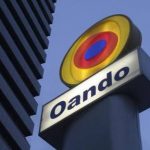Shareholders applaud Oando as it declares FYE 2018 profits
Shareholders applaud Oando as it declares FYE 2018 profits
Oando PLC has once again demonstrated its ability to deliver good results and create value for shareholders. The indigenous oil company on Friday, March 29, published its financial results for the full year ended, December 31, 2018. Despite a challenging local environment, Oando was able to maintain a trend by posting positive results for the third consecutive year with the announcement of a N28.8 billion Profit-After-Tax (PAT); a 46% increase from the N19.8 billion the company posted at full year end 2017.
A review of Oando’s results shows positive performance across most of its financial indices; reaffirming the company’s concerted efforts and commitment to reversing the tide following the oil price crash in 2014. Following the negative fallout from the plunge in oil prices in 2014, the company has successfully executed strategic initiatives that has enabled continued growth across all financial performance indices three years in a row; in a challenging local terrain this is indeed a feat worth applauding. The company’s positive performance has ensured it maintains its position as Nigeria’s leading indigenous oil company. As at full year end 2018, turnover increased by 37% to N679.5 billion compared to N497.4 billion in 2017, driven primarily by higher oil prices resulting in higher oil revenue and higher gas prices, which led to higher gas revenues. In addition, gross profit grew by 9% to N96.3 billion from N88.1 billion in 2017.
The company’s balance sheet remained strong with a 46% increase in PAT to N28.8 billion from N19.8 billion in the comparative period of 2017 driven by higher revenue and income tax credits. Its total Group borrowings decreased by 11% to N210.9 billion from N237.4 billion in 2017, while long term borrowings decreased by 23% to N76.8 billion compared to N99.6 billion in the same period of 2017.
Worthy of note is the fact that, since its acquisition of ConocoPhillips Nigeria in 2014, Oando has embarked on a proactive drive to significantly reduce its debt and liabilities. From a N473.3 billion corporate facility in 2014 to N210.9 billion in FYE 2018, a 55% decrease and in its upstream business, the company has reduced its debt by 70% from $801.6 million in 2014 to $260 million as at FYE 2018.
Speaking on the significant reduction in borrowings, the Group Chief Executive of Oando, Wale Tinubu said: “Our asset base is delivering strong free cash flows as evidenced by a 70% reduction in our Upstream Borrowings since the closure of our landmark acquisition of ConocoPhillips’s Nigerian assets in 2014.”
The company’s FYE 2018 results are further evidence that the company’s management team is focused on maintaining a strong balance sheet, profitability, value creation and a business that is indeed here for good. The company’s third year of strong financial performance is evidence that the company is back to business as usual, thus rebuilding stakeholder confidence in the brand as a viable business to invest in.
Speaking on the FYE 2018 results, Alhaji Kabiru Tambari, an Oando shareholder from Sokoto Zone Shareholders Association, commended the management of Oando for leading the company to yet another profit, he said: “We can see light at the end of the tunnel. My faith in the management of the company grows from strength to strength with each financial result. I’m hopeful that soon, in the very near future we the shareholders can finally reap the fruits of our labour.”
Wale Tinubu hinted at the prospect of a dividend payment in the near future. He said: “We remain confident in our ability to deliver significant value to shareholders in the years ahead as well as resuming our dividend payments.”
In the year under review, the Nigerian economy experienced the highest Gross Domestic Product (GDP) growth rate since the third quarter of 2015. GDP grew by 2.4% year-on-year in the last quarter of 2018 which surpassed market projection of a 2.1% gain. The economy maintained a positive growth trajectory driven by the recovery of oil prices for the most part of the year. This gave a boost to the macroeconomic fundamentals which saw a reduction in inflation to 12.4% at the end of 2018 compared to 12.7% as at December 2017.
Nigeria alongside Angola, Algeria and Egypt remained a major contributor to Africa’s share of global oil production which increased slightly by 0.3% to 8.7% standing at 8.1 million bbl/d. Crude oil prices averaged $72/bbl per barrel compared to $52/bbl in 2017. However, in the fourth quarter of 2018, crude prices weakened while natural gas prices strengthened with higher LNG prices. The realized selling price of commodities in 2018 compared to the prior year increased by 33% for crude oil, 27% for natural gas deliveries and reduced by 3% for NGLs.
The exchange rate was relatively stable in 2018 in different segments of the Forex market. At the parallel market, the naira hovered within the band of N361/$ – N363/$. Higher oil prices and stable local production levels of crude oil are the two key critical factors that restored calm in the forex market.
However, the oil sector shrank 1.6% in the fourth quarter of 2018, after contracting 2.9% in 2017. The country produced 1.91 million barrels of crude oil per day (mbpd), lower than 1.95 mbpd in the same period of 2017. As a result, the oil sector accounted for 7.1% of GDP compared to 7.4% in FYE 2017.
Against this backdrop, ExxonMobil recorded a $20.8 billion profit in the full year ended December 2018 compared with $19.7 billion in same period of 2017 while Total recorded a net income of $13.6 billion in 2018 from $10.6 billion in 2017, like Oando both businesses showed growth from 2017 in their financial performance.
Speaking further on Oando’s 2018 FYE financials Wale Tinubu said: “Our 2018 results demonstrate the solid foundation we have built across volatile commodity price cycles, and our ability to deliver profitability despite a challenging local operating environment. Over the last few years, we have developed a reliable platform for future growth through the execution of a corporate strategy designed to streamline our operations, reduce our debt and optimize our asset portfolio.”
In addition to an impressive financial statement, the company recorded operational highlights. In the Upstream, Oando recorded a 2% increase in proven oil reserves to 479.8 mmboe from 470.7mmboe while net revenues in 2018 increased to $407.0 million from $333.7 million in 2017.
According to a press statement issued on the company’s website, the outlook for 2019 is optimistic. The press statement read: “Our upstream business will continue to pursue production growth initiatives through strategic alliances, whilst ensuring operational efficiency and fiscal prudence.”
In the downstream, Oando traded over 14 million barrels of crude oil under various contracts with the Nigerian National Petroleum Corporation (NNPC) as well as delivering 739,876 MT of refined products, acting as a key source of liquidity to the Group. The company continues to solidify its relationships with leading international and local banks, maintaining a sizeable and well diversified structured Trade Finance facilities required to support future growth.
Oando streamlined its portfolio in 2016, by focusing on its dollar denominated businesses in the upstream and downstream trading sector to drive profitability and ensure value accretion to shareholders as a mechanism to navigate the crash in oil prices which negatively impacted all players in the oil and gas sector. Since the successful implementation of its corporate strategic initiatives the company has recorded its 3rd consecutive year of profits.
Indigenous companies such as Seplat Petroleum have also picked up from the oil glut; the company’s revenue saw an increase from 2017 standing at N228 billion in 2018 compared to N138 billion in 2017. This increase in revenue was as a result of higher oil production together with higher oil price realizations. Despite this increase in revenue the company recorded a lower PAT compared to 2017, specifically N45 billion PAT for full year end 2018 from N81 billion at full year end 2017.
Despite talks of diversification, it is highly unlikely that the country’s oil sector will lose its relevance as the main driver of the country’s economy in 2019. Key policy reforms will be an imperative to support and sustain macroeconomic stability. These include oil and gas sector reforms, especially the Petroleum Industry Bill (PIB), a reduction in the cost of governance at all levels amongst others.
A total of 42 oil block licenses held by a mix of international and indigenous operators will expire this year. The renewal of the licenses is expected to boost Government revenue, create more openings for indigenous players to participate and encourage more investment in the nation’s oil and gas industry. Already the country’s 2019 budget has received a boost with the coming on stream of Total Petroleum’s Egina with a 200,000 barrels of oil per day to the country’s crude oil production.
As supply increases and oil prices rise, volatility will continue to shape strategy in the oil and gas sector globally. Consequently, portfolios have to be resilient, innovation needs to thrive, and productivity and capital efficiency must remain the bedrock of operations. Only those companies and economies who can do all these will prevail in the near to medium term.




Leave a Reply